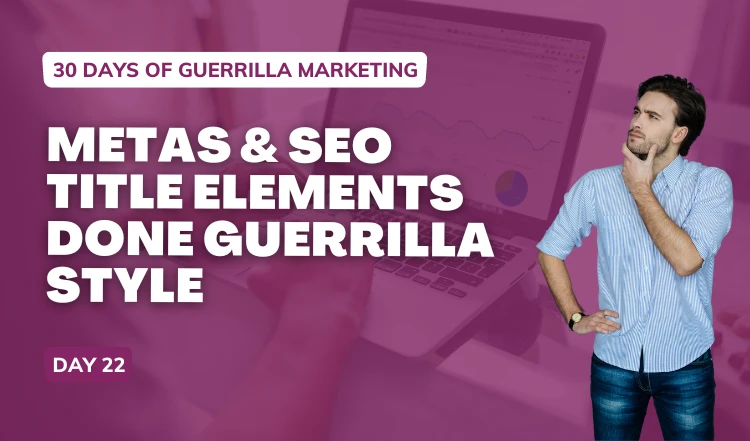Creating online content serves several functions, not the least of which is promoting your brand, product, or service. Content also connects you to your target audience, provides actionable information, increases trust, and creates an affinity among potential clients and customers.
In short, creating excellent content and, just as importantly, posting that content on a regular, ongoing basis is essential for success in today’s business world. Consumers eat up content today like a hungry child eating candy, with a voraciousness that’s hard to fathom. Creating content that fills their needs is one of the best ways to attract them, engage with them and, eventually, sell them your products and services.
It's Not the Content; It's How Highly It Ranks on Google
The biggest challenge with creating excellent content isn’t the content itself, but the ease with which potential customers can find it. Like the old saying about a tree falling in the woods, if nobody finds your online content, will they know you exist?
The answer, unfortunately, is no, which is why creating content that boosts your SEO is vitally important. By following the best SEO practices, your content will rank highly on search engines, chiefly the most significant of them, Google.
When your content is optimized for SEO, it will rise to the top of Google when consumers search their database, which is crucial. The fact is, if you’re not on page 1 of Google, the chance that potential customers will see your content is almost zero. That’s because less than 1% of consumers go past page 1 when searching!
To help your content make it onto Google’s first page, we’ve collected the Top 9 Best Practices for How To Create Content that Boosts Your SEO below. If getting your content ranked highly on Google is your goal (and it should be), read on!
Follow the Numbers
Not sure how important it is to improve your content’s SEO and rank highly on Google? If so, the stats below will go far towards changing your mind:
- 93% of all internet experiences start on a search engine like Google.
- Over 99% % of Google searchers never go past the first page of their particular search engine. (Less than one percent!)
- Content on page 1 of Google has a 33% chance of getting clicked, a click-through rate (CTR) you won’t find with any other platform.
- Google is, by far, the #1 search engine, accounting for upwards of 70% of all searches on the web. (Baidu and Bing get about 12% each, while Yahoo gets a measly 2%.)
- 70% of marketers believe SEO is more important than PPC.
Using New Keywords and Terms is Important
Many business owners use popular keywords, phrases, and terms in a rush to rank highly on Google. The problem is, many other businesses are using them also. Considering that 15% of daily Google searches are new, you quickly realize that using new terms and keywords is vital.
Write Like a Human
Need to rank for something new? The best way is to write naturally so that Google’s Bidirectional Encoder Representation from Transformers (BERT) will reward you for it and rank your content highly. BERT looks for language that sounds natural as well as educational. That makes the key to hacking BERT as simple as writing about subjects that educate your potential customers and doing it in a natural-sounding way.
Targeting Keywords is a Must
Regardless of your experience, almost everyone knows the importance of keywords and key phrases in their online content. Not only do these critical words tell Google what your content is about, but they also drive potential customers to your website, blog, or lead funnel. The need to find and use the best keywords in your content is thus essential.
Educate Yourself About Google's Ranking Factors
Here’s a fact; Google uses a lot of factors to rank content. Indeed, there are 200 of them, some proven to drive traffic while others are a bit more contentious. For example, keywords as the first words in a domain. This factor shows that a domain starting with a target keyword has the edge over other sites that don’t or have their keyword later in the domain name.
Is this important for creating your content? Not exactly, but many other ranking factors are, making it essential to know them all. The good news is that The HOTH has done this for you. Their complete list of Google’s Top Ranking Factors is a must-read if you want your content to rank highly on the world’s biggest search engine.
Proper Formatting and Headings are Important
When someone searches for content, they want that content to be easily accessible and, if you will, digestible. That means it needs to be formatted well and uses attractive headings that quickly answer a user’s question. (So that they don’t click away to another page.)
Labeling sections using headings is essential, highlighting keywords, using lists, and, in some cases, even using the appropriate font. Not only will this look better on a blog or website, but it will also be easier for the user to read. That’s key for getting visitors to stay on your site longer.
Shoot for 2000+ Words in Your Written Content
Many business owners ask about the length of written content, like a blog article or “how-to” post. The best answer is that the content should be enough to answer a question or explain a subject thoroughly. The 2nd best answer is 2000+ words.
Why? Because the top position, Google articles contain approximately, 2400 words. Shooting for at least 2000 words will thus put you in the same league as the top-ranking articles.
By the way, that same rule holds for voice search results also. When using voice search, Google tends to source their results from articles that contain over 2000 words.
The takeaway here is that if you’re posting shorter articles for some reason, whether to keep short-attention-span readers around longer or because you don’t like writing lengthy articles, you’re likely hurting your results rather than helping them.
Don't Skimp on the Meta Description
Many bloggers and business owners overlook one of the essential content creation tasks; writing an excellent meta description for their content. Writing a well-crafted meta-description is crucial to getting excellent search results from your content, with the power to significantly raise the CTR and provide organic search results.
Backlinks are Incredibly Important
One of the most significant factors that must be considered when creating content is that backlinks are vitally important for good results. Indeed, most SEO experts put backlinks higher, importance-wise, than word count and keywords! That’s because backlinks are crucial for pulling in all-important organic traffic.
Organic traffic refers to a visitor who arrives at your website or blog due to their search results on Google and the other search engines. In other words, it is free traffic, which is the much more desirable opposite of paid traffic.
So organic traffic is what you want, and the way to get it is with backlinks. But here’s the thing; 91% of all web pages get almost zero organic traffic because they have few backlinks. In fact, nearly 56% of web pages don’t have a single backlink! That means there isn’t a single referring domain that points to them from somewhere else on the web!
That’s a huge problem, especially when you consider that the top results on Google’s SERP (aka search engine results page) have almost 4x the number of backlinks as the results below them.
In short, setting up backlinks to authoritative sources is a must if you want your content to rank highly on Google. It also provides an opportunity for many SMEs in that, simply by adding plenty of backlinks, they can outrank their competitors easily.
Base Your Online Content on Search Intent
It’s crucial you write for your audience based on what they’re searching for and what they want to know, learn, or discover. That’s called search intent, and it’s another crucial element of excellent content. There are four different types of search intent, including:
- Navigational, when someone is searching for a specific page.
- Informational, the need for a specific answer to a query.
- Transactional, as when the user wants to complete an action like signing up for a newsletter.
- Commercial, using a free offering of a product, service, or information to attract potential customers.





